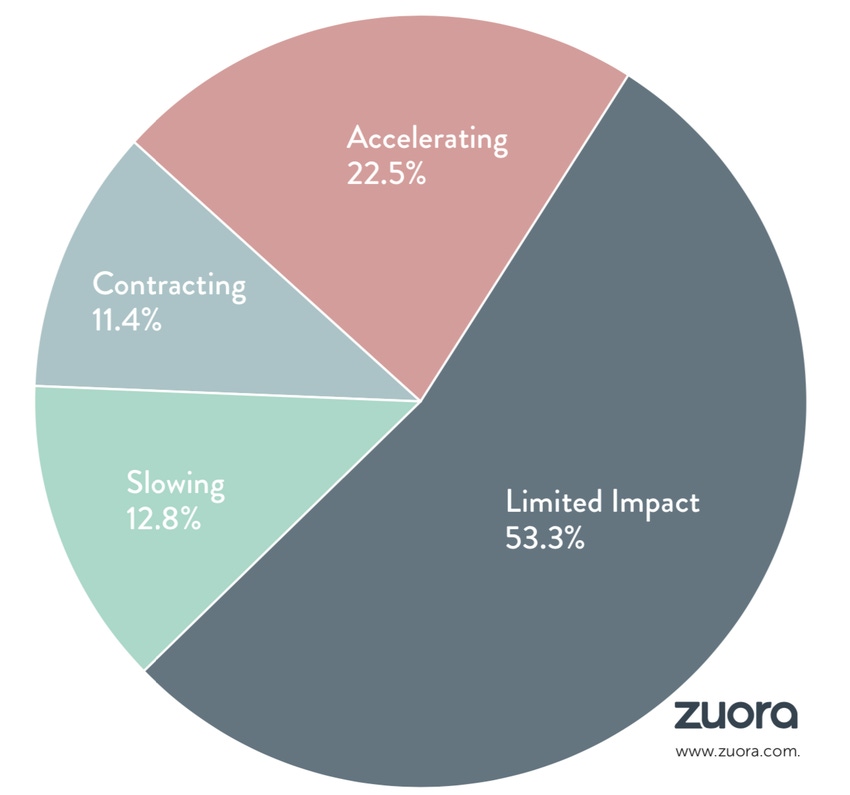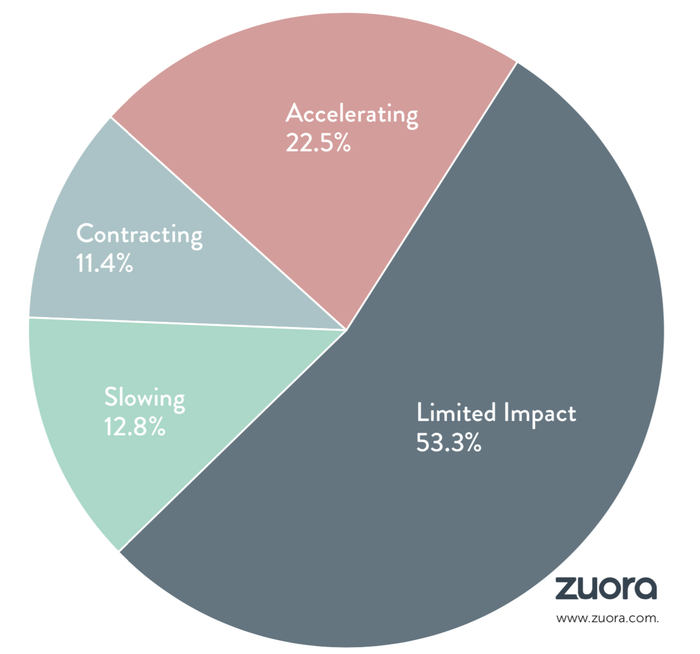IoT Subscriptions for Manufacturers Grow Through the Pandemic
Manufacturers have turned to subscription-based automation in recent months to gain resilience against supply chain disruptions and cut costs.
July 28, 2020

Looks like manufacturers are making the most out of data collection. They’re using subscription services to monitor their plant equipment as well as monitoring their products once they’re out in the field. During the pandemic, these data collection and management subscriptions are doing surprisingly well. Zoura – a software company that manages data subscriptions – noticed there wasn’t much of a falloff as the impact of the virus grew.
Zoura took its data and produced the Subscription Impact Report. It analyzed data from 700+ companies globally during the March – May 2020 period and found that four out of five subscription businesses were still growing their subscriber base amid COVID-19. A surprising 50% of subscription companies growing just as fast as they were before, while 18% were seeing subscriber growth rates accelerate. Seventeen percent of companies, including those in the IoT sector, were seeing a slower growth rate, they were still growing.

Continued Growth in a Dire Economy
A likely explanation for the continued growth in IoT service subscriptions is that companies see the gaps in the global supply chain during the current crisis and turned to IoT services as a solution. The goal was to turn to robotics, IoT, and other forms of automation to gain resilience in the event of a future outbreak – and simply to cut costs. “We’re talking about companies that are using IoT to reduce labor. They quickly embraced the transformation,” Michael Mansard, principal for business transformation at Zuora, told Design News. “Companies like Siemens and GM deployed these services extensively.”
Mansard noted that many of the highly automated companies quickly expanded their IoT services when the pandemic hit. “We’re seeing manufacturers like Caterpillar and Thermo Fisher Scientific on a clear path of innovation when it comes to monetizing connected machines,” said Mansard.
Highlights from the Report
4 out of 5 subscription companies are growing. Only 14% are contracting
For most companies, the revenue associated with each subscription is not growing as fast, pointing to a slowdown in upsells and expansions
Subscription suspensions increased 4X and credit memos for payment relief increased 2.5X
Subscribers on free plans increased by 1.2X
To some degree the report reflects the ups and downs of manufacturing. The industry took a hit at the beginning of the pandemic, and then it began coming back. “Manufacturing is different from other subscription services because there is a machine involved,” said Mansard. “We saw it slow down by 75%. Then it increased per customer by 42%. Subscription services have been able to focus specifically on a strong customer base before the pandemic.”
Part of the increase is a matter of bringing new customers into the manufacturing subscription services. “In manufacturing, the subscription service companies started to offer free trials,” said Mansard. “In other cases, the companies doubled down on adding value for existing customers to keep them on board. They accelerated their services to maintain the customer relationship so they wouldn’t have to reacquire the customer after the pandemic.”
Tracking Assets in the Field
As well as using connectivity for its operations, some manufacturers sell after-market connectivity that tracks the condition of the product in the field. Caterpillar produces connected machines with integrated sensors that gather data about usage. This data helps customers optimize the use of their fleets and reduce the overall cost of ownership. As a result, the company has new recurring revenue streams, closer relationships with their customers, and the largest connected fleet in the world, with more than 500,000 connected assets in the field.
Subscription Companies Adjust to Support Growth
To set themselves up for continued growth post-COVID, the data subscription service companies focused on several strategies including:
Usage-based pricing. Zuora research shows that companies that adopt this strategy grow faster than peers
Improving data insights. Offering a recurring service provides manufacturers and vendors a deeper look into customer use habits than they are used to. This helps to make full use of the new access to improve the service
Activating in emerging markets. The connected auto market is expected to grow by $6.85 billion during 2020-2024, offering opportunities for new revenue streams
Mansard noted that monetizing connected devices and machines via subscription services is designed to ensure manufacturers can weather economic storms or external market pressures. “Manufacturers offering digital services are tailoring their pricing and packaging to meet ever-changing demands,” said Mansard.
Rob Spiegel has covered automation and control for 19 years, 17 of them for Design News. Other topics he has covered include supply chain technology, alternative energy, and cyber security. For 10 years, he was owner and publisher of the food magazine Chile Pepper.
About the Author(s)
You May Also Like





